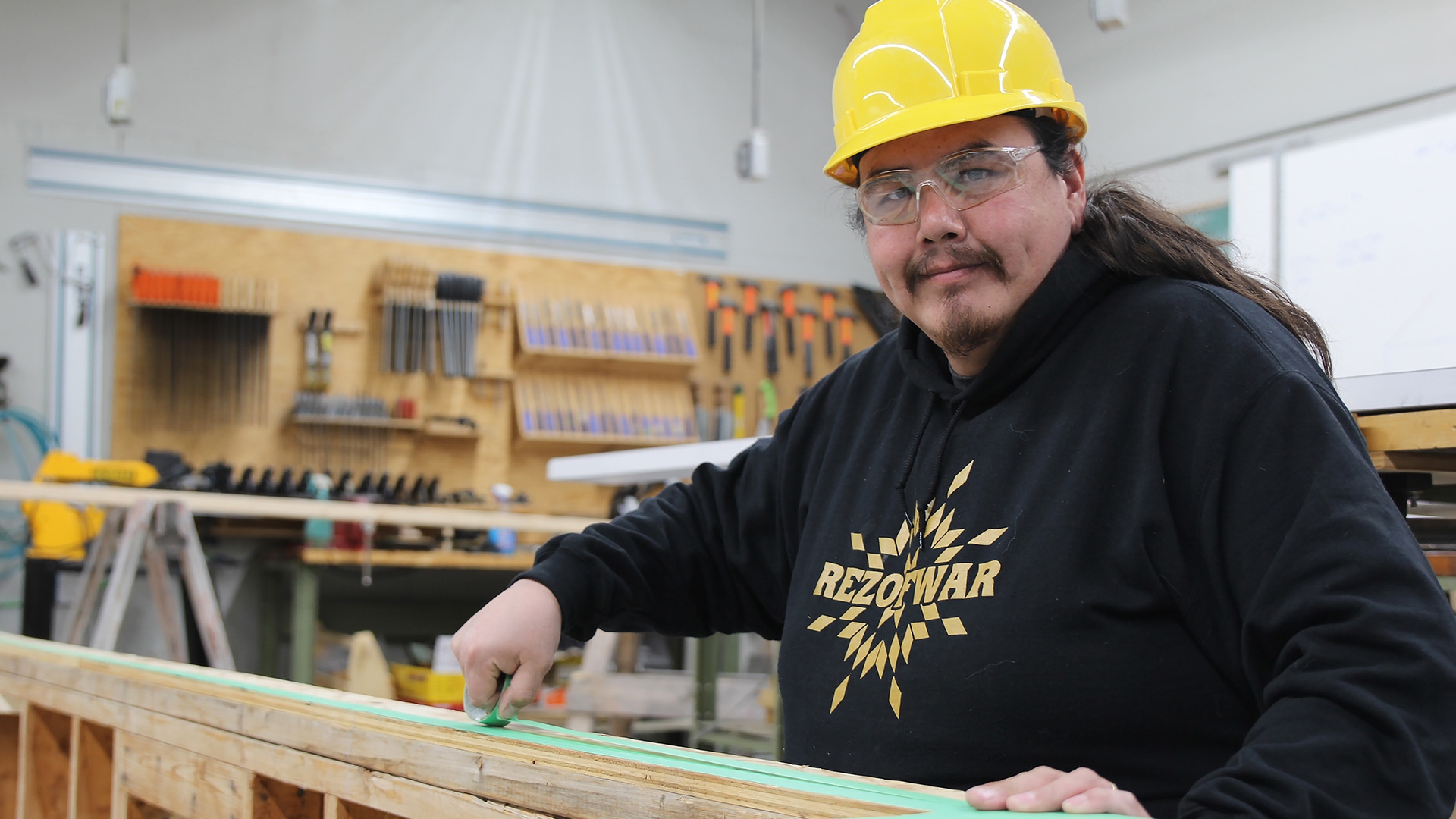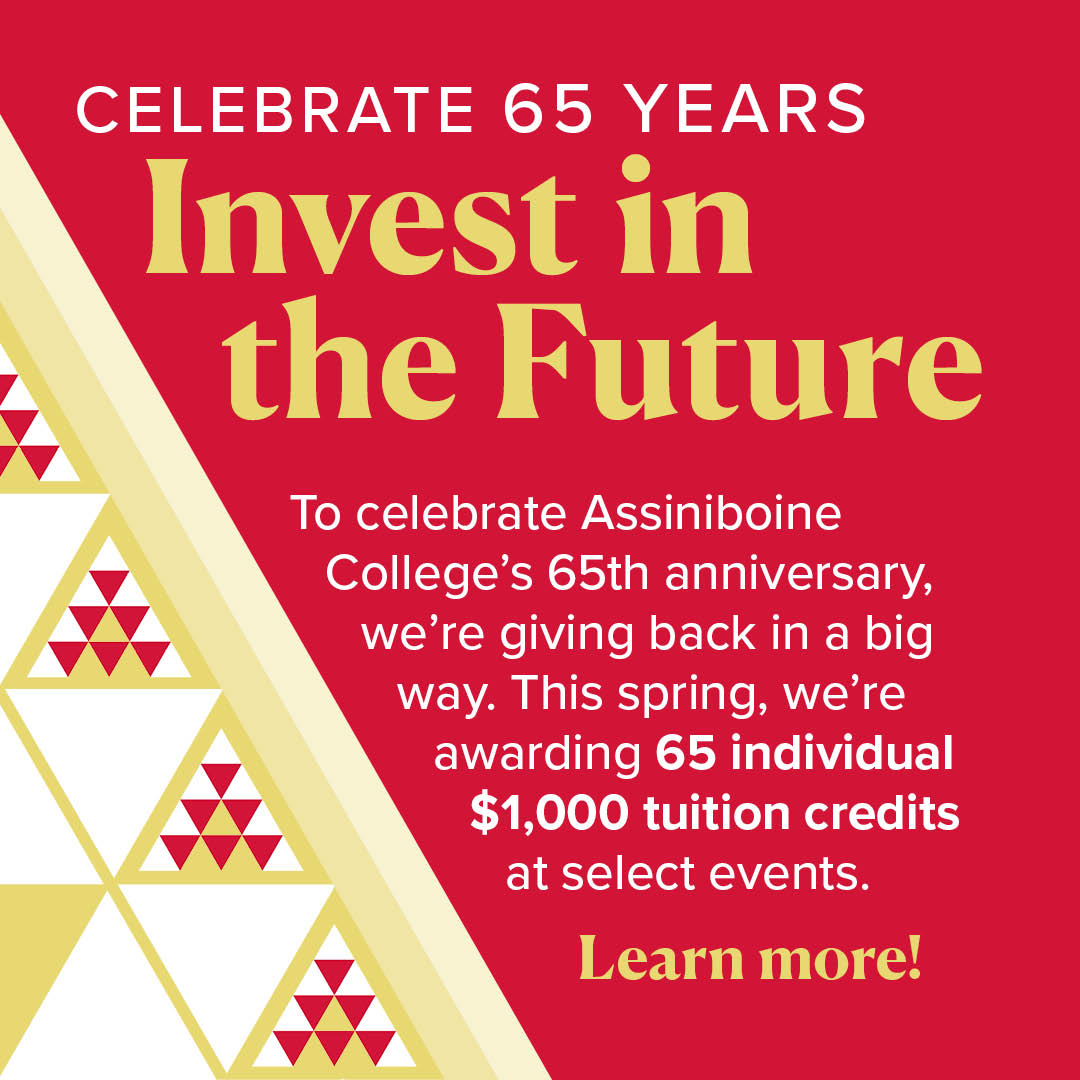Applied Building Construction
Overview
Assiniboine’s six-month Applied Building Construction certificate program covers key employment skills for carpentry and construction.
KEEP ME IN THE LOOP!
Fill out the form below to receive more information about our program and related events.
Program Learning Outcomes
- Complete work in compliance with provincial and/or national codes, applicable laws, standards and ethical practices in industry.
- Interpret project plans and produce technical sketches and documents to support building construction and renovation projects.
- Select and use technologies to obtain, organize and communicate building construction and renovation information.
- Solve problems related to the implementation of building construction and renovation projects by using basic mathematics, building design and building science.
- Select, maintain and safely use hand tools, and portable and stationary power tools, when performing layout, cutting, fitting and assembly operations, and standard woodworking machinery.
- Complete building and renovation stages, from site layout and footings to the application of interior and exterior finishes, in accordance with blueprint specifications and conservation principles.
- Select a range of materials and equipment for their appropriate application to building construction and renovation projects.
- Develop and use strategies for ongoing professional development to remain current with industry changes, enhance work performance and explore career opportunities.
- Comply with health and safety practices and procedures in accordance with current legislation and regulations.
- Assist in the preparation of material estimations and quotes and complete all work in compliance with the rights and conditions of contractual obligations, provincial and/or national Building Codes, applicable laws, bylaws, standards and ethical practices in the construction, renovation and building fields.
- Communicate and collaborate with diverse clients, supervisors, coworkers and tradespersons to complete projects on time and to maintain effective working relationships.
Examples of what graduates from this program can do:
- Read and interpret blueprints, drawings and sketches to determine specifications and calculate requirements.
- Prepare layouts in conformance to building codes, using measuring tools.
- Measure, cut, shape, assemble and join materials made of wood, wood substitutes, lightweight steel and other materials.
- Build foundations, install floor beams, lay subflooring and erect walls and roof systems.
- Fit and install trim items, such as doors, stairs, moulding and hardware.
Success Factors
You might be a good fit for this program if you would enjoy:
- A short, introductory program in carpentry and construction
- A physically demanding occupation
- Envisioning and building projects
- Problem solving and critical thinking in a construction environment
A valid driver’s license and access to a vehicle is strongly recommended given the potential need to travel for practicum placement.
The industry and program environment require individuals to:
- Be reliable, punctual, and regularly attend.
- Move around and work within the environment, negotiating different areas including stairs and ladders, confined spaces, heights, uneven terrain and scaffolds.
- Complete responsibilities requiring standing, bending, and climbing.
- Have the strength, dexterity, balance and stamina required to work in or on equipment.
- Work in noisy, dusty and/or fume-filled areas with appropriate personal protective equipment
- Interpret technical documents, drawings, specifications, building codes, regulations, bylaws and standards.
- Communicate effectively with others including suppliers, co-workers, other trades people, safety and building inspectors, manufacturer representatives, customers, and apprentices.
- Work in industry-specific shifts, schedules, and conditions
- Be reliable, punctual, and regularly attend work.
- Listen to direction and act on that accordingly.
- Demonstrate safety-conscious attitudes and work practices.
- Working outdoors in extreme weather conditions.
- Working in a collaborative team environment or independently as the situation requires.
Interested in exploring similar program options?
We've got you covered! Here are some other great program options to consider.
Applied Electrical Installation
Applied Plumbing Installation
Carpentry and Woodworking
Admissions
Admission Requirements
- A complete Manitoba Grade 12 or equivalent
- Consumer/Essential Mathematics 40S or equivalent
If you received your education outside of Manitoba, please review the equivalent admission requirements: Interprovincial or International.
English is the language of instruction at Assiniboine. All applicants educated outside of Canada or in a country not on the test exempt list are expected to meet the English language proficiency requirements.
DON'T MEET ADMISSION REQUIREMENTS?
If you don’t meet admission requirements, visit our Centre for Adult Learning to upgrade courses.
Careers & Connections
Careers
- Residential or commercial construction
- Contracting companies
- Material merchandiser
- Prefabrication centres
- Maintenance companies
Connections
Students who successfully complete the accredited program with an accumulative average of 70% or better in the trade subjects and level for which the program was accredited, gain employment and register as an apprentice within two years of graduating, will receive credit for Level 1 in-school technical training and 900 hours in the Carpenter apprenticeship program.
Assiniboine has a number of agreements with other colleges, universities and professional organizations, making it possible to apply credit taken at Assiniboine to programs at other institutions. For information on agreements, see Articulation Agreements.
Tools & Supplies
Our classrooms, labs and shops are equipped with the necessary equipment that you need to make the most of your experience. However, there are some tools and supplies that you will need to purchase for personal use to help you with your studies. Much of what you purchase you’ll be able to use after you graduate and begin your career.
Program Checklists, Textbooks, and Supplies
Program Checklists:
Supplies:
ASSINIBOINE BOOKSTORE
Textbooks, supplies and uniforms may be purchased at the Assiniboine Bookstore at the Victoria Avenue East Campus. Booklists are available from your school office 30 days prior to the start date of your program.
Technology Requirements
Students in this program are expected to have a computer at home with internet access that meets the technical needs outlined by the program. For more details, see At-Home Computing.
Courses & Costs
Costs
Estimated Program Costs
| Credits | 47.5 |
| Tuition | $2,960 |
| Course Fees | $1,590 |
| Students' Association fees (including Health Premium) | $430 |
| Estimated textbooks, tools, and supplies | $1,890 |
All fees are estimated and subject to change without notice.
For more information, visit the Fees and Charges page.
Courses
To graduate with an Applied Building Construction certificate, students must successfully complete 46.5 academic credits and 1 practical credit. The minimum passing grade for each course is 60% as indicated on the course outline.
Courses
| Title | Credits/CEUs | Elective | Distance | PLAR |
|---|---|---|---|---|
Blueprint Reading (CARPW) (DRFT-0001)This course provides the fundamental skills necessary for students to become familiar with architectural blueprints. |
3 credit(s) | No | No | No |
Building Materials (CPWW-0004)Properties and structure of wood are studied in this course, followed by orientation in the types, standard sizes and characteristics of the basic materials of construction. |
1.5 credit(s) | No | No | No |
Building Science (SCIE-0007)This course begins by focusing on the concepts of understanding the house as a system. Students then study thermal insulation requirements, types and applications, including energy-efficient construction techniques. |
1.5 credit(s) | No | No | No |
College Foundations (PEDV-0356)This course improves students' ability to navigate the college experience and environment, including student's rights, roles, and responsibilities. In this course, students reflect on their skills, attitudes, and expectations and develop learning strategies to help them to become successful, resilient, and self-directed learners. The course covers topics such as success in online learning, time management strategies, learning strategies, assessment taking strategies, academic integrity, information and digital literacy, and wellness, among others. It integrates elements of student orientation. |
0 credit(s) | No | No | No |
Communications (COMM-0260)This course includes instruction in techniques to improve both written and oral communication with prospective employers, co-workers and clients. Effective strategies for customer service are emphasized. It also serves to familiarize students with the regulations related to the workplace. As well, students receive an introduction to the use of computer software and hands-on experience with Windows operating system, Internet and email. |
1.5 credit(s) | No | No | No |
Concrete Forming Technology (CPWW-0012)In this course, students study the characteristics of quality concrete, its mixture, transport, placement, finishing and curing. Other course material includes forming for footings, walls, columns, beams, slabs and stairs. |
3 credit(s) | No | No | No |
Construction Safety (WRKP-0030)Along with instruction in erection and use of staging and ladders, students become familiar with ropes, rigging and hand signals, as well as construction site health and safety hazards and appropriate personal protection devices. |
3 credit(s) | No | No | No |
Construction Trades Geometry (MATH-0013)This course provides students with a review of the basic geometry skills required for working in the construction trades. |
1.5 credit(s) | No | No | No |
Hand Tools (CPWW-0031)This course, along with Woodworking Machines, is a prerequisite to all program elements. It teaches students how to select, care for and use the tools of the trade, and provides instruction in basic procedures. |
9 credit(s) | No | No | No |
Practicum - APBLC (PRAC-0298)Prerequisite: Cumulative weighted grade point average (CWGPA) of 2.0 or greater, WRKP-0030 Construction Safety |
1 credit(s) | No | No | No |
Roof Framing (CPWW-0007)In this course, students learn how to calculate, lay out, cut and install rafters for equal slope gable and hip roofs. |
6 credit(s) | No | No | No |
Shop Layout (CPWW-0003)This course enables students to develop the skills needed to prepare shop drawings using drafting conventions and commonly available shop tools. |
3 credit(s) | No | No | No |
Wood Frame Construction (CPWW-0005)Students learn terminology, techniques and applicable codes relating to wood frame house construction. Practical elements include joist and plate layout and construction of floor, wall and ceiling components. |
6 credit(s) | No | No | No |
Woodworking Machines 1 (CPWW-0002)Prerequisite: CPWW-0031 Hand Tools |
3 credit(s) | No | No | No |
Frequently Asked Questions
How is the Applied Building Construction program able to offer funding incentives to NEET Youth?
The college is able to offer the Applied Building Construction program through a partnership with Algonquin College.
How much is the application fee for the Applied Building Construction program?
There is no application fee for this program. However, you must attend an information session before applying. It is a mandatory part of the application process.
I don’t live in Manitoba… can I still apply?
Yes, the Applied Building Construction program is open for application to anyone. Funding incentives for Indigenous (First Nations, Métis and Inuit) youth between the ages of 18 to 30 not in employment, education, or training (NEET Youth) are available.
Can I apply to Applied Building Construction as an international student on a study visa?
No, the Applied Building Construction program is not open to international students. Please see assiniboine.net/international for more information on studying as an international student.
How will applicants be chosen for the Applied Building Construction program?
Acceptance to this program is based on a combination of attendance at an online program information session, your online assessment results, your high school and/or post-secondary transcripts and resumé, and your ability to meet program admission requirements.
Who should take the Applied Building Construction program?
This program gives students the basic skills in carpentry and woodworking.
This tuition-free program is open to Indigenous (First Nations, Métis and Inuit) youth, 18 to 30 years of age, not employed, education and training (NEET Youth).
I can’t make any of the Applied Building Construction information session dates; can I still apply?
No, attendance at an information session is a mandatory part of the application process for Applied Building Construction.
What can I expect at the online assessment session?
You will be assessed in English, Mathematics, Mechanical Aptitude and general software/document skills.
Details on the assessment will be provided via email once you have attended an online information session.
What do I need to bring to each session?
You do not need to bring anything to the initial online program information session.
Details on the online assessment will be provided via email once you have attended an online information session.
If you are selected to proceed to the next step in the application process, please ensure you have original, official transcripts (high school and post-secondary) and your current resumé.
What does the Applied Building Construction program give me when I graduate?
Students who successfully complete the accredited program with an accumulative average of 70% or better in the trade subjects and level for which the program was accredited, gain employment and register as an apprentice within two years of graduating, will receive credit for Level 1 in-school technical training and 900 hours in the Carpenter apprenticeship program.
What happens if I’m not accepted to the Applied Building Construction program; can I apply again next year?
At this time, the tuition-free opportunity for NEET Youth is only available for the February 2023 intake. Applied Building Construction is an annual program and can be applied for each year. In future, you will need to submit a new application to this program, and the program may or may not have funding available for NEET Youth.
What are my other options for taking Applied Building Construction at Assiniboine?
Assiniboine continues to offer the Applied Building Construction certificate program with an annual February intake; it may or may not have NEET Youth funding. Assiniboine also offers a nine-month Carpentry and Woodworking certificate in Brandon; the program begins each September and is open to International students.
Do I need prior experience in carpentry?
No; however, you will be assessed for overall mechanical aptitude during the assessment session.
Where do I get my transcripts if I’ve been out of high school for a long time?
Contact your high school or the student records area of the education department in the province where you completed high school. In Manitoba, visit the Student Records website.




